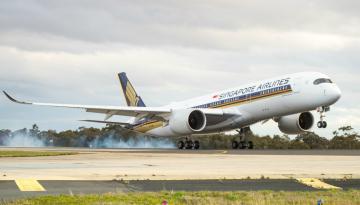
As COVID-19 grounds swathes of airline fleets, companies that profit off the dismantling and trade of aircraft parts are seeing early signs of an expected rebound in activity as carriers accelerate plane retirements.
While companies that store, dismantle, buy and sell used aircraft parts see opportunity in parked planes, a sudden increase in the supply of used parts risks depressing prices in the estimated $3 billion per year industry - despite demand from airlines seeking to lower maintenance costs - industry analysts say.
Canada's aircraft recycling company Aerocycle is bidding to buy grounded planes for the sole purpose of reselling for parts, instead of just recycling aircraft as they are retired, its CEO said.
The fate of the world's pool of grounded planes is being closely watched by players in the market for used-serviceable material, with one report from consultants Oliver Wyman forecasting "a tsunami of demand" for such parts, as airlines seek to lower costs.
The number of planes dismantled for parts or scrap could double to 1000 annually through 2023, up from roughly 400 to 500 planes per year since 2016, according to data firm Cirium.
In 2020, Naveo expects 2000 aircraft will be retired, or parked and not returned to service, up from 680 in 2019. But those planes would not all be immediately dismantled, as some carriers wait in case market conditions improve, managing director Richard Brown says.
UK-based Air Salvage International would normally dismantle between 40 and 50 aircraft a year, with buyers already lined up for their parts, such as their engines.
This year, it has a backlog of parked aircraft without any likely buyers for their parts.
Early Retirements
The pandemic is expected to result in a 55 percent drop in 2020 passenger numbers and has prompted early retirements of older planes, including the grounding of Boeing 747 jets by British Airways, some of which are headed to Air Salvage.
Fewer twin-aisle planes flying internationally means less demand for their parts, with the exception of certain aircraft used to transport cargo.
Air Salvage said it was approached by an aircraft leasing company about dismantling several A380s, but with only about 5 percent of the world's A380s in service, demand is slim for their parts.


